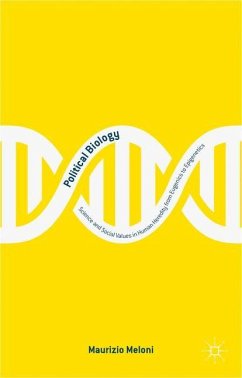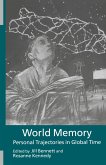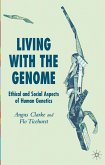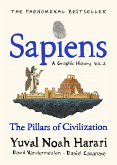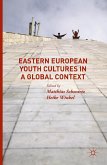This book explores the socio-political implications of human heredity from the second half of the nineteenth century to the present postgenomic moment. It addresses three main phases in the politicization of heredity: the peak of radical eugenics (1900-1945), characterized by an aggressive ethos of supporting the transformation of human society via biological knowledge; the repositioning, after 1945, of biological thinking into a liberal-democratic, human rights framework; and the present postgenomic crisis in which the genome can no longer be understood as insulated from environmental signals.
In Political Biology, Maurizio Meloni argues that thanks to the ascendancy of epigenetics we may be witnessing a return to soft heredity - the idea that these signals can cause changes in biology that are themselves transferable to succeeding generations. This book will be of great interest to scholars across science and technology studies, the philosophy and history of science, and political and social theory.
In Political Biology, Maurizio Meloni argues that thanks to the ascendancy of epigenetics we may be witnessing a return to soft heredity - the idea that these signals can cause changes in biology that are themselves transferable to succeeding generations. This book will be of great interest to scholars across science and technology studies, the philosophy and history of science, and political and social theory.
"A fascinating social and political history of human heredity spanning over 150 years from Darwin to the present moment. ... it is certainly essential reading for students of history and politics of science, I would urge anyone who feels overwhelmed by the pervasiveness of modern biology and its medical imprint, and who wish to make sense of it, to at least give it a cursory read." (Rakesh Kalshian, Down To Earth, downtoearth.org.in, July, 2017)
"The book offers not only an updated and complex synthesis of existing historiography on the whole range of topics it deals with, but also presents the reader with a future-oriented narrative framework that by its very argumentative structuring invites critical reflection on the synthesis it presents, as well as on the implications and consequences issuing from the present day entwinement of biology and politics. I recommend the book very highly ... ." (Snait B. Gissis, Studies in History and Philosophy of Biological and Biomedical Sciences, Vol. 62, April, 2017)
"Political Biology is a dense and useful addition to the voluminous literature on the history of the biological theories of heredity and their sociopolitical consequences." (Michel Dubois, European Journal of Sociology, Vol. 58 (3), 2017)
"With Political Biology Maurizio Meloni has pulled together a strikingly wide range of scholarly sources from the history of the human sciences and heredity ... . There is a great deal that historians of science will enjoy and admire about Meloni's work, particularly the breadth of reading and commitment to delivering the value of historical research to contemporary social and policy predicaments ... . Political Biology is engaging, clear and an excellent inclusion in HPS and STS syllabi." (Dominic J. Berry, British Journal for the History of Science, Vol. 50 (1), 2017)
"The book offers not only an updated and complex synthesis of existing historiography on the whole range of topics it deals with, but also presents the reader with a future-oriented narrative framework that by its very argumentative structuring invites critical reflection on the synthesis it presents, as well as on the implications and consequences issuing from the present day entwinement of biology and politics. I recommend the book very highly ... ." (Snait B. Gissis, Studies in History and Philosophy of Biological and Biomedical Sciences, Vol. 62, April, 2017)
"Political Biology is a dense and useful addition to the voluminous literature on the history of the biological theories of heredity and their sociopolitical consequences." (Michel Dubois, European Journal of Sociology, Vol. 58 (3), 2017)
"With Political Biology Maurizio Meloni has pulled together a strikingly wide range of scholarly sources from the history of the human sciences and heredity ... . There is a great deal that historians of science will enjoy and admire about Meloni's work, particularly the breadth of reading and commitment to delivering the value of historical research to contemporary social and policy predicaments ... . Political Biology is engaging, clear and an excellent inclusion in HPS and STS syllabi." (Dominic J. Berry, British Journal for the History of Science, Vol. 50 (1), 2017)

